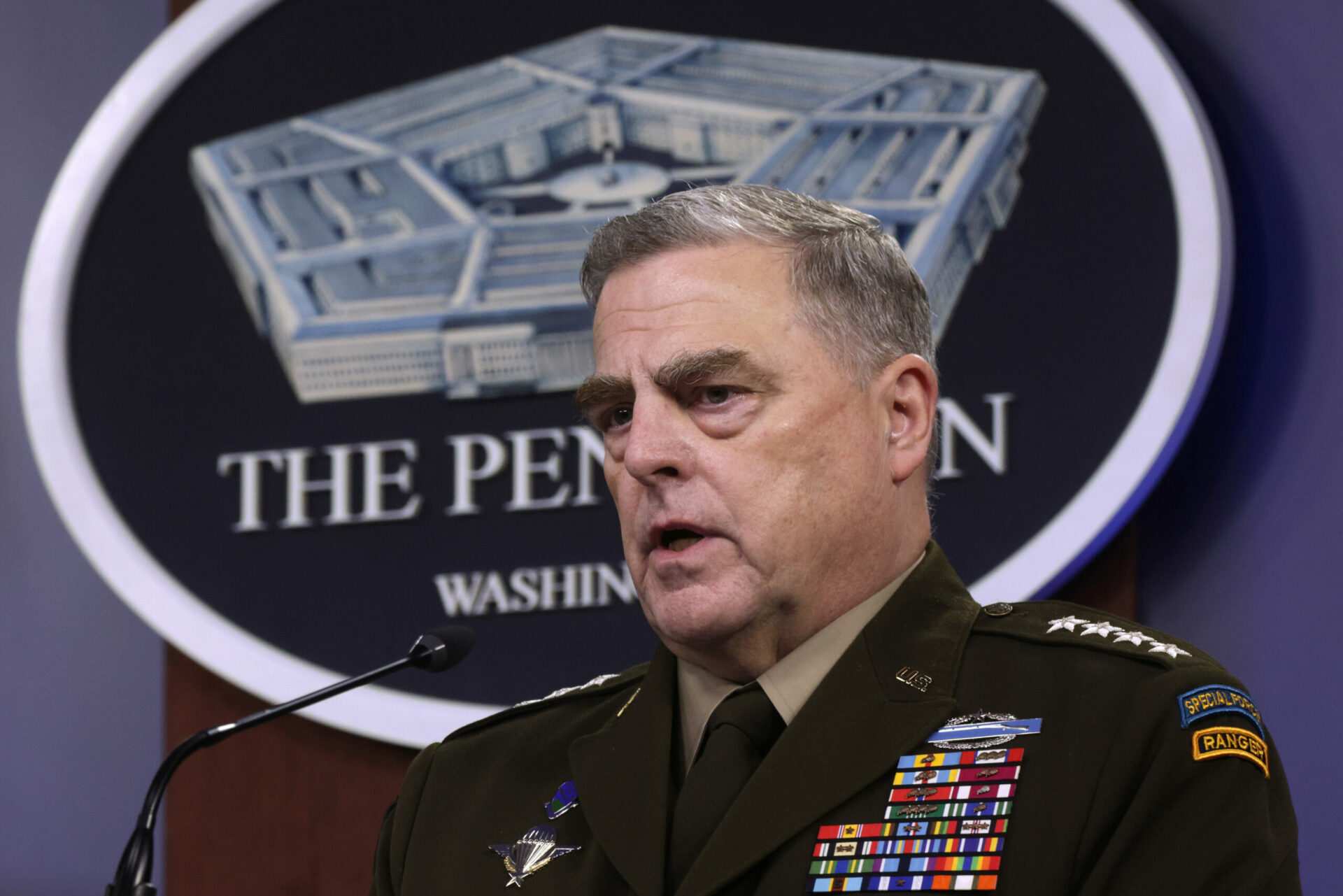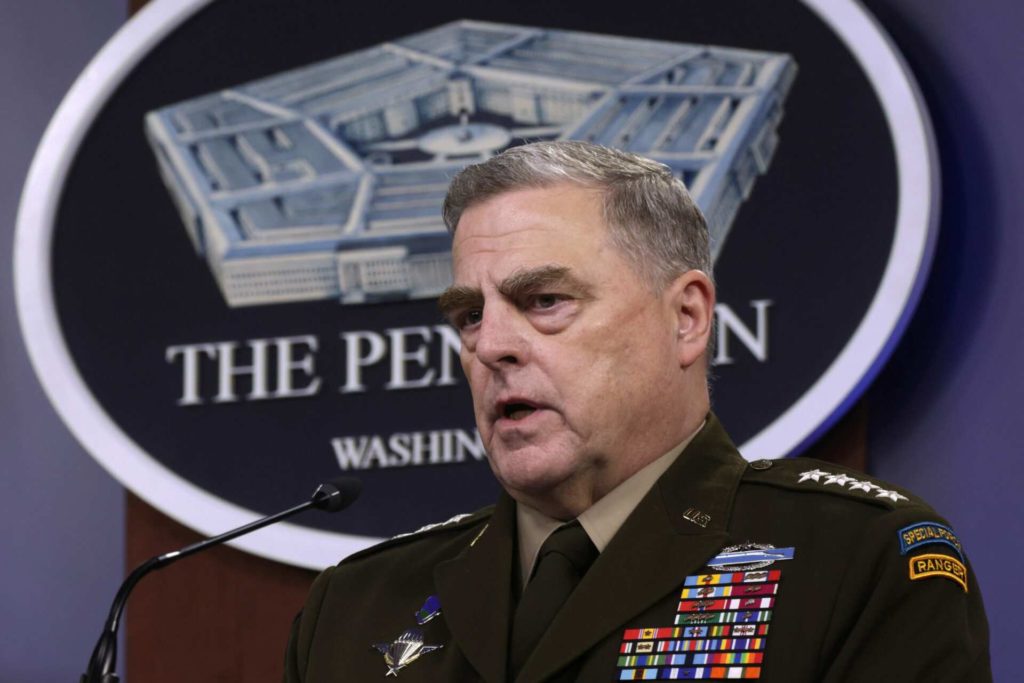
This article was originally published by Radio Free Europe/Radio Liberty and is reprinted with permission.
The top U.S. commander, General Mark Milley, has said Russia will not achieve a military victory in Ukraine, forecasting a “hard” and “bloody” fight going forward, as the Ukraine Defense Contact Group (UDCG) of countries supporting Kyiv in its fight against Russia conducted an international virtual meeting.
“This war, militarily, is not going to be won by Russia. It’s just not,” Milley told reporters on May 25 following the virtual meeting.
He added that the Kremlin’s original goals – which included removing the current Ukrainian government — “are not achievable militarily. They’re not going to be done.”
Still, he said, the presence of Russia’s large fighting force in Ukraine will make Kyiv’s attempt to recapture all of its territory, including that seized by Moscow in 2014, not likely to happen “in the near term.”
“That means fighting is going to continue. It’s going to be bloody. It’s going to be hard. And at some point, both sides will either negotiate a settlement or they’ll come to a military conclusion.”
U.S. Defense Secretary Lloyd Austin, who also participated in the virtual conference, said Ukraine’s Western supporters had contributed almost $65 billion in military aid since the start of Russia’s full-scale invasion in February 2022.
But high on Kyiv’s agenda now is the delivery of promised F-16 fighter jets, which are more sophisticated than the Soviet-made warplanes now part of its arsenal.
Milley said it would take a “considerable length of time” to deliver the planes and related infrastructure and to train pilots on the fighters.
He said that had the West provided the jets earlier in the conflict, it would have taken funds away from more pressing needs at the time.
Moscow overnight unleashed a fresh wave of Iranian-made attack drones on Kyiv and several Ukrainian regions overnight, but all drones were shot down, the Ukrainian air defense reported on May 25.
“A total of 36 drones were launched toward Ukraine from the north and south. Presumably, the enemy aimed to attack critical infrastructure and military facilities in the western regions of the country,” the air defense said.
Following the attacks, President Volodymyr Zelenskiy accused Moscow of terrorizing Ukrainians and thanked the military for downing all the drones launched by Russia overnight.
“The enemy continued to terrorize Ukraine by launching 36 Shaheds. None reached its target,” Zelenskiy said on social media. “I’m grateful to our air defense forces for the 100 percent result.”
Earlier, officials said air raid alerts had been declared in the Kyiv, Chernihiv, Zhytomyr, Kirovohrad, Mykolayiv, Kherson, Dnipropetrovsk, Odesa, Volyn, Ternopil, Vinnytsya, and Lviv regions.
Fighting continued for the city of Bakhmut, which has become the epicenter of the war in Ukraine’s Donetsk region, the Ukrainian military said, despite claims by Russia that it controlled the whole city.
Ukrainian defenders repelled 28 Russian assaults in Bakhmut, Ukraine’s military said in its daily report on the front situation on May 25.
Russian shelling also killed a civilian in Chasiv Yar, a locality close to Bakhmut, Donetsk region Governor Pavlo Kyrylenko said on May 25.
Yevgeny Prigozhin, the chief of Russia’s Wagner mercenary group that has spearheaded the attack on Bakhmut, on May 25 claimed his fighters were starting to leave the city he claims to have fully captured.
In a video published on Telegram, Prigozhin said his troops will hand Bakhmut over to the regular Russian armed forces by June 1.
Prigozhin said that “if the military faces hardships,” some Wagner fighters might stay in Bakhmut.
The Defense Ministry has yet to comment on Prigozhin’s latest statement.
In his nightly video address, Zelenskiy said the providing of U.S.-made F-16s to Kyiv is a clear sign that Russia is destined to lose the war in Ukraine.
“The very first Ukrainian F-16 will be one of the strongest signals from the world that Russia will only lose because of its aggression. It will be weaker and further isolated,” Zelenskiy said.
“The main thing is speed in training and in supply, meaning the time between decisions in real protection for our skies,” he added.
The head of Zelenskiy’s office, Andriy Yermak, said on May 25 that a total of 106 prisoners of war were returned to Ukraine from Russian captivity. Those released in a prisoner swap are military personnel that fought in the eastern city of Bakhmut, Yermak said.
“We are bringing home 106 of our people. Soldiers from the Bakhmut front — eight officers and 98 soldiers and sergeants…. Each of them is a hero for our country,” Yermak wrote on Telegram.
Meanwhile, Russia’s Federal Security Service (FSB) on May 25 was quoted by Russian news agencies as saying it had arrested two Ukrainians who it claimed were planning to attack Russian nuclear power plants.
“A sabotage group from the Ukrainian foreign intelligence service…tried to blow up some 30 power lines of nuclear power plants in Leningrad and Kalinin” in early May, the FSB was quoted as saying.
On May 24, the Russian Defense Ministry said three Ukrainian remote-controlled surface vessels had attempted to attack a Russian warship in the Black Sea.
The ministry said in a Telegram post that the Russian craft had been protecting the TurkStream and Blue Stream gas pipelines that transport gas from Russia to Turkey but that no damage was done to it and that all attacking vessels were destroyed.
Kyiv did not immediately comment on the claim, which could not independently be verified.
American Military News Rephrased By: InfoArmed
